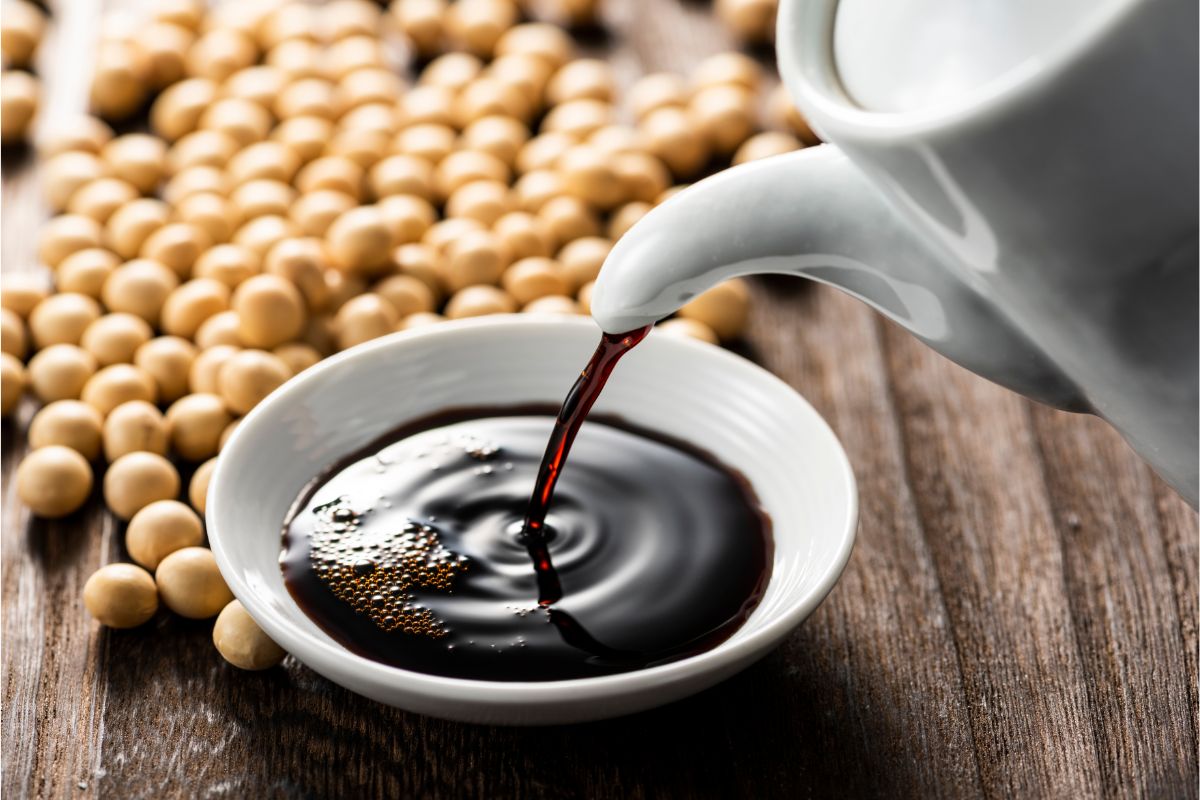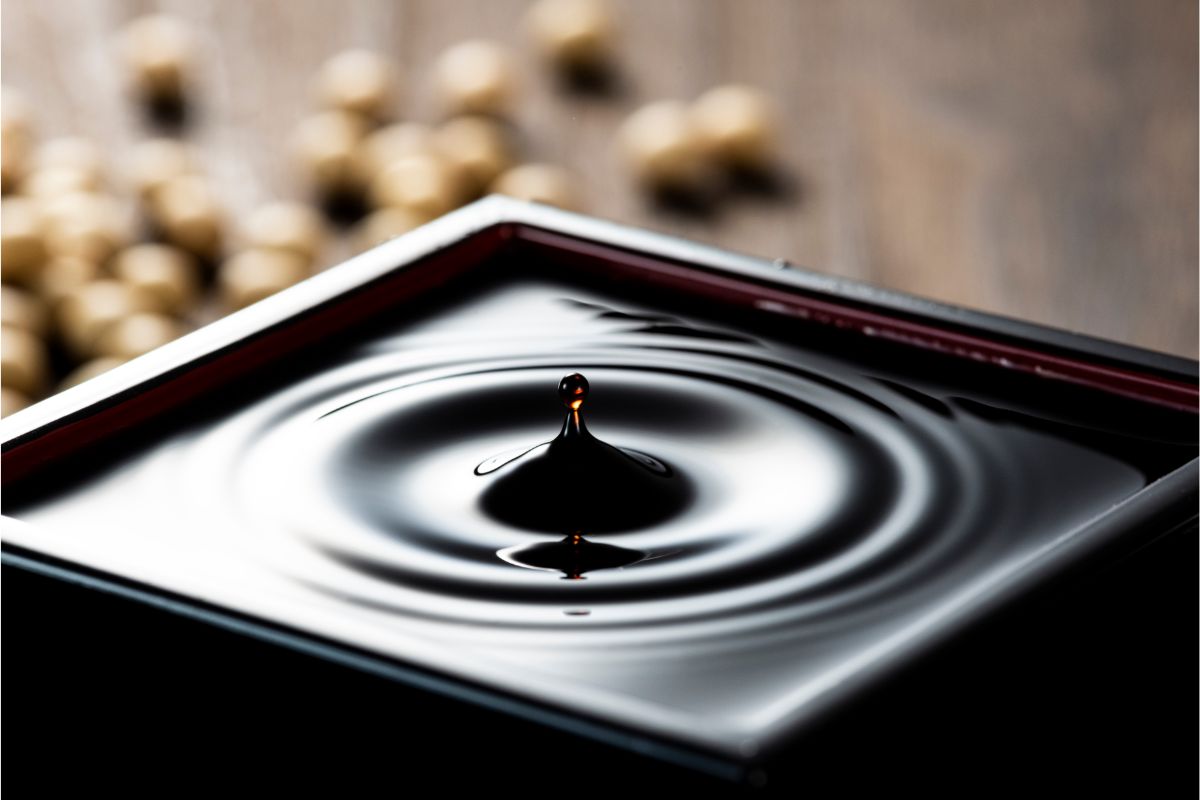MSG: this chemical-sounding compound is feared by many, but it may not be as bad as you think.
However, some people are naturally sensitive to MSG, and not everyone wants it in their food. Although MSG can be found in soy sauce, it’s not a necessary ingredient – so, good news!

You’ll find plenty of varieties that don’t contain it. Here’s everything you need to know about soy sauce and MSG.
What Is Soy Sauce?
Soy sauce is a liquid condiment with Chinese origins. Traditionally, soy sauce is made from the fermented paste of soybeans, brine, roasted grains, and Aspergillus sojae molds, but the ingredients can vary.
Soy sauce is a versatile condiment with a number of uses. Soy sauce can be used to replace salt in many dishes, and it adds extra flavor to plenty of your favorite recipes, including stir-fries.
You can even add it to your sauces, stocks, and dips to give them an extra tasty edge! Other popular uses include seasoning rice and noodles, marinating meat, and more.
What Is MSG?
Monosodium glutamate (often just called MSG), is a flavor enhancer made from L-glutamic acid. MSG is naturally present in many foods, and artificially added to others.
You’ll usually find MSG in restaurant foods, but it can also be seen in deli meats, soups, canned veggies, and more.
MSG is a white and odorless powder that’s usually used as a food additive. You may also see it referred to as E621. It’s usually made by fermenting carb sources, such as molasses and sugar beet.
MSG has a very specific taste, also known as umami. Umami is a meaty flavor that’s popular in Asian cooking, and it can also be found in processed foods in the west.
The recommended daily intake of MSG is somewhere between 0.3-1 grams.
Is MSG Unhealthy?
This common flavor additive is a little divisive. Although it has a reputation for being harmful to our health, other experts agree that it’s safe, especially when consumed in lower doses. But is MSG really bad for you?
The truth is – it’s probably not as bad as you think. Unfortunately, MSG has gained a pretty terrible rep from years of xenophobia and misinformation.
And of course, its chemical-sounding name and appearance probably don’t help its cause.
However, there’s no real research to suggest that MSG is bad for you. All major international food organizations, such as the FDA and WHO, consider it to be safe for human consumption.
Like other foods and chemicals, some people are more sensitive to MSG than others. Some consumers have reported experiencing transient symptoms such as headaches, palpitations, and tingling after eating it.
However, major health organizations were never able to pinpoint the exact cause – but it’s believed that some people may just not get on that well with MSG, especially if they consume large amounts.
If you think you might be sensitive to MSG, there’s no evidence to suggest that it will cause you any long-term damage, or significant health effects.
However, if your symptoms are unpleasant, avoid consuming foods that contain it.

Soy Sauce: Ingredients
So, what’s actually in your soy sauce? Here are the most common ingredients you’ll find in this condiment:
- Soybeans
- Wheat
- Salt
- Water
- Aspergillus sojae
- Lactic acid bacteria
- Roasted grain
- Brine
Now, your soy sauce probably won’t contain ALL of these, but you’ll find a few in your bottle. Soy sauce ingredients can vary depending on whether your sauce was naturally or commercially brewed.
Commercially manufactured soy sauce can also contain other additives and fermenting agents. Check the bottle for more information.
Does Soy Sauce Contain MSG?
Some soy sauce brands contain MSG, but not all.
MSG is a flavor enhancer found in many condiments, and it’s not unusual to find it in soy sauce. MSG has that popular umami flavor, which compliments a variety of sauces, including BBQ, ketchup, mustard, and soy sauce.
If your commercial soy sauce has a distinctively salty flavor, it probably contains MSG. Check the product label for more information.
If you’re sensitive to MSG, you’ll still be able to enjoy soy sauce. You could either make your own or browse through your local grocery store for a brand that doesn’t contain it.
MSG is not an essential ingredient in soy sauce, so you’ll find many MSG-free varieties to choose from.
Frequently Asked Questions
This depends on the amount of MSG you’ve consumed, your weight, and your metabolic rate. It could take anywhere between 2- 24 hours for MSG to leave your system.
Although there are claims that MSG can damage your brain, there’s not enough evidence to support this. However, MSG does act as a neurotransmitter, which can stimulate your nerve cells.
MSG actually contains less sodium than salt. MSG has two-thirds less sodium than table salt, which can make MSG a great alternative if you want that salty flavor, without all the sodium.
While their flavors aren’t identical, MSG comes pretty close.
Final Thoughts
MSG is a non-essential ingredient in soy sauce, so you’ll find plenty of brands that don’t contain it.
If you want to be on the safe side, you can even try to make your own soy sauce, and enjoy all of its flavors without any of the added chemicals.
- How To Reheat A Cheesesteak - November 5, 2023
- What Are Three Must Have Kitchen Knives? - September 22, 2023
- How To Protect Edges Of Pie Crust - June 15, 2023








